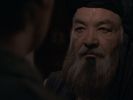Eye For Film >> Movies >> Kandahar Break: Fortress Of War (2009) Film Review
When you think of Afghanistan, the chances are that you think of war, of soldiers, but of course there are also a lot of foreign workers there who are not soldiers. Richard (Sean Dooley), the hero of Kandahar Break, is an English engineer doing contract work for a company involved in clearing landmines. It's a dangerous but necessary job which will gradually allow peasants to return to work the land. But for Richard, there are dangers that go beyond the literal minefields. Early on, a cultural misunderstanding leads to an altercation that nearly gets him killed. He is saved, in part, by the hasty intervention of his interpreter, Jamila. But his feelings for her are about to get him in far deeper trouble.
Western audiences used to seeing the Afghan conflict presented in terms of the West versus the Taliban may find Kandahar Break a bit of a revelation. Director David Whitney has spent time there himself (though the film was shot just over the border in Pakistan), and he works hard to bring to light the realities of a far more complex situation. Richard's company is working in a Taliban controlled area because mines still need to be cleared no matter who is in charge. Elsewhere there are rebels who don't believe in the concept of Afghanistan at all, but who are fighting for the homelands recognised there long before British colonials arrived to draw up their maps. It's a fractious situation. In some places, Richard attracts violence by looking at people in the wrong way; in others, he can bond over conversations about Leeds United.

It's a fascinating setting. Unfortunate, then, that the central story is so heavy handed, clunkily scripted and framed like an episode of Eastenders. Leaping feet first into forbidden romance, it tries to push all the hot buttons at once and ends up in a mess. Tatmain Ul Qulb is stunning as Jamila, but beyond that there is little to tell us why Richard has fallen for her, or she for him. The melodrama surrounding their situation means that its brutal consequences don't have the emotional impact they should. Where we ought to be feeling for people who are desperate and seem to have little chance of freedom, instead we are shaking our heads at people who are just bloody stupid.
Overall, this feels like a labour of love from a director who just doesn't know what he's doing. Its ending comes across like a pastiche of the work of Shane Meadows by somebody who missed the point. The situation in parts of Afghanistan is extreme and stories emerging from those places are dramatic, but they need to be more subtly told in order to engage with audiences. Higher production values, especially when it comes to lighting, would also go a long way. That said, the background stories in this film are more intelligently explored and make an important contribution to ongoing public debate about the future of the area.
Reviewed on: 02 Mar 2010


















